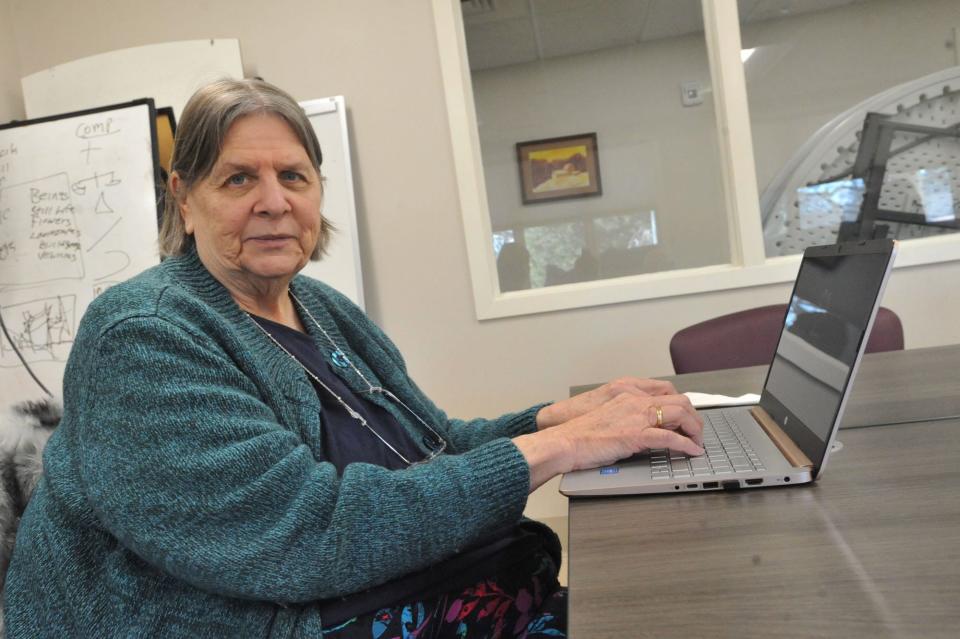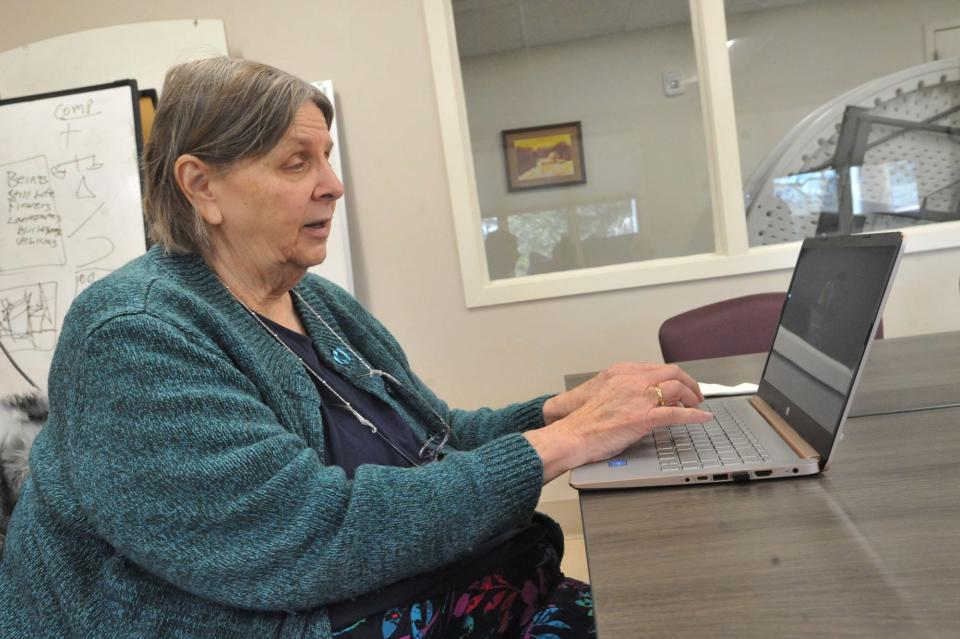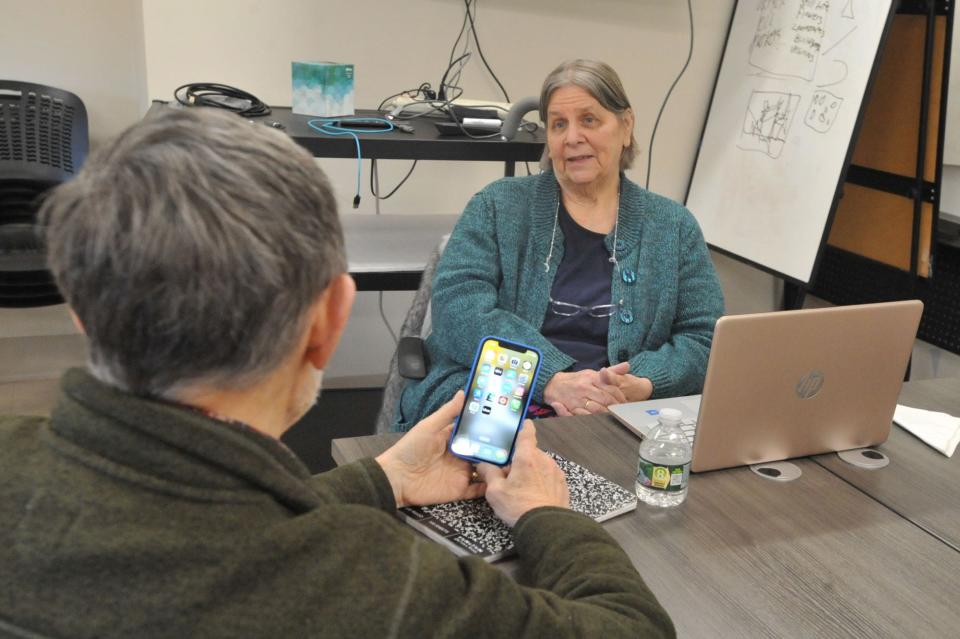If you hear a voice shouting at you from your computer, turn it off. It's a scam
MILTON − By the time the 78-year-old Quincy woman connected with digital coach Grace Buscher, her bank account had been cleaned out of her $14,000 life savings.
A digital scammer had played successfully with her confusion and fear. She wound up doing things that might cause some people to wonder, "Why would anyone do that?"
After the scammer got her on the phone, she'd followed his instructions, gone to a nearby Apple store and used her credit card to purchase thousands of dollars worth of gift cards. The store staff, suspecting a theft, had tried unsuccessfully to stop her.
After she left the store, she gave the gift card numbers to the scammer, who was waiting on the phone. She thought he was a bank security officer protecting her bank account. She then went on to Home Depot and Lowes to buy more gift cards and also turned those card numbers over to the scammer.

Buying those gift cards was a big mistake
The next day she began to realize that by buying the gift cards and sharing the card numbers, she had not "saved" her bank account at all. She had given away all the money in it.
"She was convinced because they (the scammers) are so good at what they do," Buscher said.
Sounding authoritative and urgent, the caller had told her that her bank account had been hacked, or invaded by a thief, and that he was part of a bank security team. He said she was going to lose all her savings if she didn't move the money out of her account right away and put it into another safe place, gift cards. She followed his instructions.
Once the woman sensed something wasn't right, she consulted the staff at Quincy Elder Services, which has a long-standing computer training program. The Quincy senior center referred her to Grace Buscher, who teaches there.

A longtime Squantum resident, Buscher has been helping seniors through the Quincy senior center for 15 years. She has owned GMBSystems, which provides computer repair and training services for consumers and businesses, since 1990.
In this woman's case, Buscher took steps to prevent further credit fraud by freezing the woman's credit so no more accounts could be opened at this time. The woman herself had reported the theft to her credit card companies; they are expected to return her money to her.
Buscher used the example in a recent workshop at the Milton Senior Center, where she is presenting a series called Digital Awareness. The six workshops cover computers (laptop and desktops), tablets and cell phones.
The overriding message is that seniors can learn to use new technology safely, but they have to be aware that scam experts looking to take their money are all around.
"Seniors need to have the information to keep them safe," Buscher said.
More: Con man tries to scam elderly Hingham woman. She put police on the phone
Scams are 'everywhere and getting worse by the day'
Buscher has a calm way of presenting her facts, warnings and recommendations of how to win against the scammers. She uses humor and believes there are no stupid questions. In 2009, at the invitation of Tom Clasby, director of Quincy Elder Services, she was one of the first to start working at a local senior center with people who want to be computer savvy.
At that point, she said, seniors were being given computers and tablets by their adult children, who often didn't have time to teach them how to use them.
It has been a fruitful partnership.
"Grace is a phenomenal teacher," Clasby said. "I feel very fortunate to have somebody with the immense knowledge that she has helping out the seniors.
"She has a great ability of explaining computers in a very simple way that makes those who are not familiar with using computers feel comfortable. Grace and her husband, Glen, have volunteered in many capacities for our community."
Glen Buscher, a retired State Land Court attorney, sometimes accompanies her to the workshops.
"It is important to get the word out on scams," Grace Buscher said. "It is everywhere and getting worse by the day. We are just getting so many emergency calls lately."
Buscher said the Social Security Administration's Office of the Inspector General has declared Thursday March 7 as National Slam the Scam Day to raise awareness of government imposter scams, which continue to spread across the United States. The web site has many resources for protecting yourself against scammers.
More: Hingham police warn residents of text and phone scams after resident, 95, loses $2,000
Sound too good to be true? Use your gut feeling
A few of her basic rules for protecting yourself on laptops, cell phones and tablets:
Educate yourself about scams. Senior centers and the Norfolk County Sheriff's office have speakers on cyber security. Pay attention to local news items from police departments, councils on aging, district attorneys and AARP. They issue notices and alerts about what scams are going around.
Know that certain types of scams target older people: those pitching romance, online purchases, pornography and cryptocurrency are a few.
"Trust your gut instinct. If it sounds too good to be true, it is."
The most common fraud attempts come from social media. "If someone becomes your friend and then about three months later, needs financial support, that is usually a scam," Buscher said. "Pay attention to what you are hearing and try to leave the emotional appeal out."
More: Phone scam costs Hingham man almost $100,000, police say. Here's what happened

Pop-up screens shouting at you are out to rob you
Lately, the scam the Quincy woman fell for has become more common. Buscher calls it a Technical Support Scam. You are working on your digital device; suddenly a pop-up screen covers your computer screen and a loud voice repeats, "Warning! Warning! Your computer has been infected by a virus (hacked)!"
This is phony. The voice instructs you aggressively to call a number it gives you. "Never call any number," Buscher says. "That call will get you in to trouble. It is not technical support, just a thief."
The Quincy woman made the mistake of calling the number and that connected her with the thieves, who said they were bank security officers. They told her the only way to secure her money was by removing it from her bank account. What they were doing was stealing it.
Buscher also tells seniors, "And don't click on any links, specially in emails. That is just a different way of connecting you to thieves who will ask for personal account information.
More: Scammers keep hitting South Shore seniors. And not getting caught.
If a computer voice shouts 'Don't turn off your computer' it's a scam. DO turn off your computer
You may also hear a voice loudly say "Do NOT turn off your computer." That actually is exactly what you SHOULD do. Turn off your computer. On a laptop, you may have to hold the power button down for 15 seconds and feel the power shut off.
Scams really are everywhere. The day after Buscher's workshop, a friend from Brockton described the same fraud attempt as the Quincy woman had experienced. The Brockton woman hear the loud voice, clicked on a bad link, but didn't call the phone number. She had to open a new bank account.
The next day, my cell phone rang and a woman told me something about my Chase bank account. I don't have a Chase bank account. I hung up. Yesterday, I clicked on an obituary memorial site and up popped an email on the server telling me I had been hacked. I closed the window.
From the FBI: Free brochure
These technology workshops can help you sort it out
There are four technology workshops with Buscher coming up at the Milton senior center. The fee is $5 per workshop; all are welcome. Registration is required. Visit MyActiveCenter.com or call Milton Council on Aging at 617-898-4893.
Here's the schedule:
Friday March 22 at 10 a.m., Search Engines: Navigating the Internet.
Friday March 29 at 10 a.m., Downloading Apps for Your Devices.
Friday April 26 at 10 a.m., How To Dispose Safely of Electronic Devices.
Wednesday May 1 at 10 a.m., All About Streaming.
Buscher gives weekly computer classes for $5 per class at the Kennedy Center in Quincy for Quincy Elder Services. On Tuesdays her classes run from 1 to 2:30 p.m. The Feb. 27 class is about Uber and Car Rides.
She also works with individuals by appointment on Wednesdays from 1 to 3:30 p.m. and Thursdays from 9 to 11:30 a.m. Call 617-376-1506 to register.
Many other local senior centers have people who are available to provide tech assistance in person or by phone. Ask where you might go.
Reach Sue Scheible at sscheible@patriotledger.com.
This article originally appeared on The Patriot Ledger: South Shore classes can help seniors avoid and outwit online scammers

